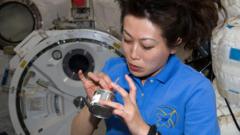In a move that may revolutionize space travel, the European Space Agency (ESA) has initiated an unprecedented experiment to cultivate lab-grown food in the harsh environments of space. Launched today, a small-scale bioreactor is orbiting Earth with the goal of assessing the potential for growing essential nutrients like proteins, fats, and carbohydrates in low-gravity conditions. Traditionally, feeding astronauts can reach exorbitant costs, with estimates up to £20,000 daily, a scenario the ESA aims to alleviate.
This pioneering project, poised to become a cornerstone for long-term lunar and Martian habitation, is co-produced by Bedford’s Frontier Space and researchers at Imperial College, London. According to Dr. Aqeel Shamsul, CEO of Frontier Space, the eventual vision includes establishing automated food production facilities not only aboard the International Space Station (ISS) but also on the Moon, thereby enabling human populations to thrive in these off-world environments.
Currently, astronauts in space face monotonous diets, primarily consisting of freeze-dried meals, with little excitement in their food options. Enter lab-grown food, harvested from engineered cells and designed to replicate traditional culinary experiences. While options like lab-grown chicken and steak are emerging on Earth, the ambition is to personalize astronaut meals uniquely suited to their varied backgrounds and tastes.
Upon successfully launching aboard a SpaceX Falcon 9 rocket, the small bioreactor is set for a three-hour orbit before returning to Earth off Portugal’s coast. Inside this mini-reactor, scientists will investigate whether food can be grown under the influence of microgravity and increased radiation, a substantial hurdle given past agricultural practices on Earth.
Adding an extra layer to the development of these space snacks is culinary expertise from Imperial College’s chef Jakub Radzikowski, who currently experiments with earthly proteins while awaiting regulatory approval for lab-grown ingredients. His goal is to craft appetizing dishes that maintain international appeal, from spicy dumplings to other beloved cuisines.
Helen Sharman, the UK’s first astronaut and an expert on the implications of nutrition in space, supports the vision of lab-grown food as a next-step enhancement for astronaut health. Lab-grown options could potentially provide tailored nutrients directly associated with the physiological alterations astronauts undergo during extended missions.
Additionally, creating a more diverse nutrient profile could combat astronauts' weight loss and dietary monotony during long missions, as Sharman emphasizes that improved and varied meal options may lead to better health outcomes and overall morale in space.
As this experiment paves the way for future culinary innovations off Earth, it symbolically plants the seeds for humanity’s ambitions to become a multi-planetary species. The endeavor seeks to make long-term space habitation not only achievable but also a more palatable, enjoyable experience for those brave enough to explore the cosmos.
This pioneering project, poised to become a cornerstone for long-term lunar and Martian habitation, is co-produced by Bedford’s Frontier Space and researchers at Imperial College, London. According to Dr. Aqeel Shamsul, CEO of Frontier Space, the eventual vision includes establishing automated food production facilities not only aboard the International Space Station (ISS) but also on the Moon, thereby enabling human populations to thrive in these off-world environments.
Currently, astronauts in space face monotonous diets, primarily consisting of freeze-dried meals, with little excitement in their food options. Enter lab-grown food, harvested from engineered cells and designed to replicate traditional culinary experiences. While options like lab-grown chicken and steak are emerging on Earth, the ambition is to personalize astronaut meals uniquely suited to their varied backgrounds and tastes.
Upon successfully launching aboard a SpaceX Falcon 9 rocket, the small bioreactor is set for a three-hour orbit before returning to Earth off Portugal’s coast. Inside this mini-reactor, scientists will investigate whether food can be grown under the influence of microgravity and increased radiation, a substantial hurdle given past agricultural practices on Earth.
Adding an extra layer to the development of these space snacks is culinary expertise from Imperial College’s chef Jakub Radzikowski, who currently experiments with earthly proteins while awaiting regulatory approval for lab-grown ingredients. His goal is to craft appetizing dishes that maintain international appeal, from spicy dumplings to other beloved cuisines.
Helen Sharman, the UK’s first astronaut and an expert on the implications of nutrition in space, supports the vision of lab-grown food as a next-step enhancement for astronaut health. Lab-grown options could potentially provide tailored nutrients directly associated with the physiological alterations astronauts undergo during extended missions.
Additionally, creating a more diverse nutrient profile could combat astronauts' weight loss and dietary monotony during long missions, as Sharman emphasizes that improved and varied meal options may lead to better health outcomes and overall morale in space.
As this experiment paves the way for future culinary innovations off Earth, it symbolically plants the seeds for humanity’s ambitions to become a multi-planetary species. The endeavor seeks to make long-term space habitation not only achievable but also a more palatable, enjoyable experience for those brave enough to explore the cosmos.
















